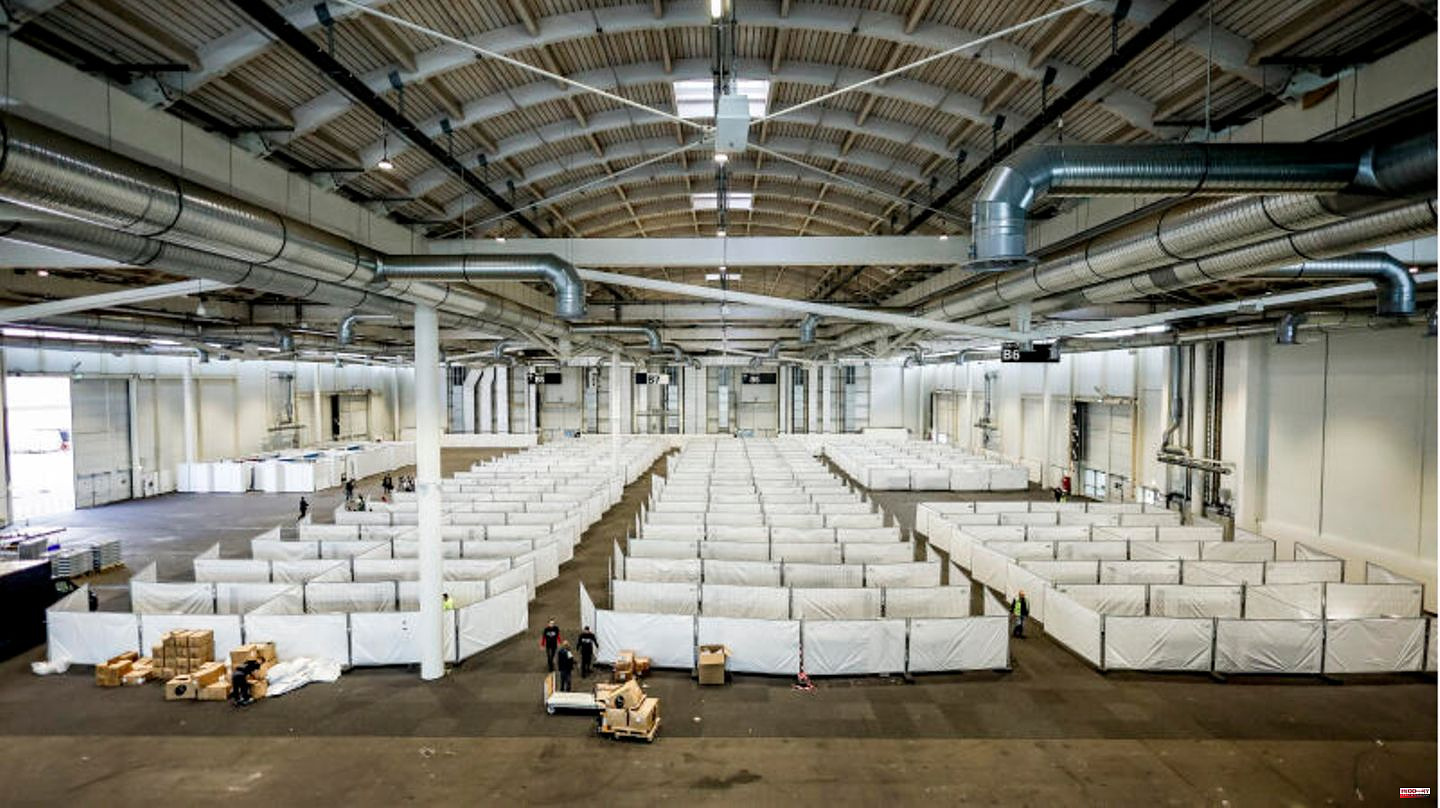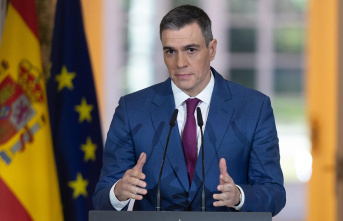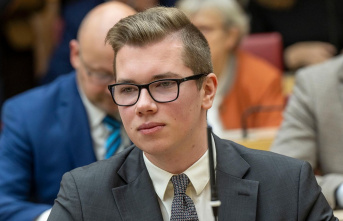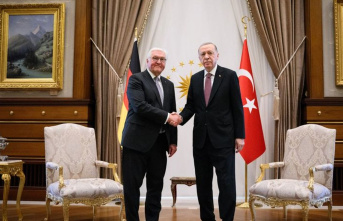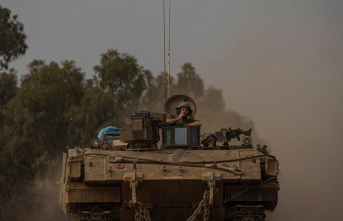Last week, state and local government representatives met with Federal Interior Minister Nancy Faeser to discuss the current migration situation in Germany. Even before this refugee summit, many municipalities sounded the alarm: In some cities there was already no more living space, and the accommodation of other refugees could hardly be provided or not at all. Cities like Hamburg, Leipzig and Dresden are already preparing to have to use exhibition halls or tent cities as refugee accommodation. Inevitably, memories of the years 2015 and 2016 are awakened, when almost 1.1 million people came to Germany, mainly from Syria, Afghanistan and Iraq. Even today there is a hint of "We can do it" in the air. But do we really have to prepare for a new migration crisis?
Uwe Zimmermann is Deputy General Manager of the German Association of Towns and Municipalities. In an interview with stern, he sounded the alarm: "As far as accommodation options in many cities are concerned, the situation is more tense than it was in 2015 and 2016. We are increasingly receiving feedback from our members that there is no longer a housing market locally." According to Zimmermann, many cities already have to deal with the question of whether to accommodate refugees in gymnasiums, community centers or trade fairs.
A look at the statistics allows comparisons with the situation seven years ago. According to the Federal Ministry of the Interior, around 1.1 million people have come to Germany from Ukraine since the Russian attack. But there are fundamental differences, explains migration researcher Gerald Knaus in an interview with the star:
"We actually already have more people who were offered protection in Germany this year than in 2015. Seen from this perspective, it seems similar on the surface, but the dynamic of this flight is completely different. This year, the majority of people in Germany entered Germany legally - from Ukraine."
Zimmermann agrees. In contrast to the procedure of 2015, when people from Syria, Afghanistan or Iraq came to Germany and the government could order the distribution "from top to bottom", Ukrainians enjoy privileges under EU law, says Zimmermann: "They have them Possibility to move freely. Under European law, you have rights and freedoms that make sense and are correct." However, this does not make it easier to distribute the refugees. Even if Zimmermann emphasizes: "The distribution of the refugees and the accommodation of the people who have come from the Ukraine has worked relatively well so far."
Nevertheless, there is a lack of housing for those in need of protection. "A significant proportion of the refugees who came to Germany in 2015 and 2016 are still there. That means the living space that was allocated for refugees at the time is still largely occupied."
We have learned from these years and improved the organization for dealing with escape situations. However, he points out: "If you don't have any more apartments available, you can't accommodate people". This would inevitably mean that refugees would again have to be accommodated in central and sometimes makeshift refugee accommodation.
So are we at the beginning of a migration crisis again? The danger of a new flight movement has not been banned, says Knaus. By mid-September, around 6.4 million Ukrainians had crossed the Polish border into the EU. 4.6 million have returned to their homeland - especially in the summer months, when the security situation in many Ukrainian cities had eased. But that doesn't mean it will stay that way, said Knaus: "These four million who went back could come back in a very short time, within weeks. The only thing that depends on it is how the war in Ukraine goes. "
In particular, due to the renewed attacks on Kyiv and the partial mobilization of the Russian armed forces, there are growing concerns that refugees will flee again. That's exactly why Knaus urges foresight: "The question is: is Germany prepared with currently one million Ukrainians in the country, should half a million more come in the next two to three months? Does Berlin have a plan then?"
For Knaus, however, the distribution of the refugees is not just a German challenge, but one of the EU. The question is: "Why are there more Ukrainians in Baden-Württemberg than in the whole of France? How can one prevent, at the European level, that tents have to be set up in Baden-Württemberg and that there is no accommodation in France or Italy?" It is now necessary to find intelligent solutions at European level, because Knaus emphasizes that "due to coercion and quotas, we have learned that it doesn't work".
Knaus fears that the situation in Europe and especially in Germany could get even worse. "This is a politically engineered displacement. Without the attack from Russia, there would be no Ukrainian refugees." With the attack on the Ukrainian infrastructure, the Kremlin is pursuing the political goal of creating a refugee movement that will overwhelm Europe. And Russia is also spreading this completely openly, says Knaus: "For weeks we have been hearing from the Kremlin and the Russian state media that the goal of the Russian leadership is to expel 20 million people to Europe."
The past few months of relaxation have only been a breather in this regard. "In the last few months, the impression has arisen that the crisis is already behind us. The fact that we have an exceptional situation was more of a side issue until two weeks ago," said Knaus.
The migration researcher therefore warns against feeling safe when it comes to this topic: "We have to go back to the way we thought in March, shortly after the start of the war, when a very large number of refugees was expected, and prepare for the fact that this can happen now. " Because a scenario in which large numbers come up within a short period of time is completely realistic, says Knaus. "Then it will be a crisis that Germany and Europe have not experienced since the 1940s - a historic crisis in a historic winter of displacement."
Should such a historic crisis occur, the municipalities in particular would be dependent on nationwide support from the federal government, Zimmermann emphasizes: "In my opinion, we are facing greater problems than in 2015 and 2016. We have a very difficult financial situation, very different from before six to seven years: high recession, high inflation, high energy prices." Cities and municipalities cannot do this alone. Until the attack on Ukraine, the municipalities in Germany would have had annual energy bills of around five billion euros, explains Zimmermann. Due to inflation and the extreme increase in energy prices, this expenditure could rise to 15 to 20 billion euros. For comparison: the annual investment expenditures of the municipalities are around 30 billion euros.
It is therefore important and right that Faeser sent the first positive signals at the refugee summit last week. It was a good summit, says Zimmermann. But he points out: "Nothing has been decided yet."
This is exactly why it is crucial to find solutions quickly, agrees Knaus. Don't rely on things going well on their own. "There is no precedent for what we are experiencing. There are already more refugees than in 2015, if another 500,000 and a million were added; that wouldn't be the end of the world, but it would be a historic challenge."
With material from DPA

